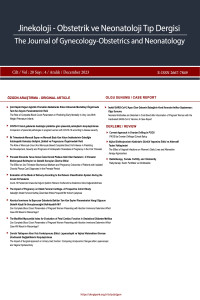Abstract
Fertilite yaşam kalitesinin önemli bir bileşenidir ve onkolojik hastalar tedavi öncesinde bu konudaki beklentileri açısından sorgulanmalıdır. Radyoterapi(RT), fertiliteyi geri dönüşümsüz ve progresif olarak olumsuz etkileyebilmektedir. Bu nedenle, fertilite isteği olan hastalar RT öncesi değerlendirilmeli ve uygun müdahaleler açısından yönlendirilmelidir. Kranial RT hipotalamus- hipofiz-over(H-H-O) aksını bozarak, pelvik RT ise doğrudan over ve uterusu etkileyerek infertiliteye neden olabilmektedir. Kranial RT'nin neden olduğu endokrinopatilerin uzun latent dönemi nedeniyle bu hastalar uzun dönem takip edilmelidir.Abdominopelvik RT sonrası gelişen doz bağımlı uterin ve over toksisitelerine bağlı olarak hastalar infertilite ve gebelik komplikasyonları açısından yüksek risklidir. Uterus ve overlerin, yaşa bağlı olarak RT sensitiviteleri farklıdır. Yaşla birlikte uterusun RT duyarlılığı azalırken overlerin RT duyarlılığı yaşla artmaktadır. RT ilişkili infertiliteye neden olabilecek eşik dozlar ile ilgili fikir birliği olmasa da, güncel veriler ışığında, hipotalamo-hipofizer aks için 30 Gy, uterus için genç kadınlarda 25 Gy, erişkin kadınlarda 45 Gy, overde akut ovaryen yetmezlik için 10 Gy, prematür ovaryan yetmezlik için ise 35 yaş altında 25 Gy’dir. Gebe kalmadan önce ebeveynlerin radyasyona maruz kalmasıyla çocukta kalıtsal genetik hastalık gelişimi açısından anlamlı ilişki gösterilememiştir.
References
- 1. primary care. Can Fam Physician 2021 ;67(10):753-7 Chaput G, Regnier L. Radiotherapy: Clinical pearls for 2. Havránková R. Biological effects of ionizing radiation. Cas Lek Cesk 2020159(7- 8):258-60.
Abstract
Fertility is an important component of quality of life and oncological patients should be questioned about their expectations before treatment. Radiotherapy (RT) can adversely affect fertility irreversibly and progressively. Therefore, patients with expectation of fertility should be evaluated before RT and guided for appropriate interventions. Radiotherapy negatively affects fertility in many aspects. Cranial RT disrupts the hypothalamus-pituitary-ovarian (H-P-O) axis, pelvic RT directly affects the ovary and uterus. Because of the long latent period of endocrinopathies caused by cranial RT, these patients should be followed up for a long time. Due to dose-dependent uterine and ovarian toxicities that develop after abdominopelvic RT, patients are at high risk for infertility and pregnancy complications. Uterus and ovaries have different radiosensitivity depending on age. With aging, radiosensitivity of the uterus decreases, while radiosensitivity of the ovaries increase. Although there is no consensus on the threshold doses that can cause RT-related infertility, according to current data, the threshold value for the hypothalamo-pituitary axis is 30 Gy; 25 Gy for young women and 45 Gy for adult women for the uterus; 10 Gy for acute ovarian failure in the ovary and 25 Gy for premature ovarian failure under 35 years of age. There is no significant relationship between parental radiation exposure and inherited genetic disease in their infants.
References
- 1. primary care. Can Fam Physician 2021 ;67(10):753-7 Chaput G, Regnier L. Radiotherapy: Clinical pearls for 2. Havránková R. Biological effects of ionizing radiation. Cas Lek Cesk 2020159(7- 8):258-60.
Details
| Primary Language | English |
|---|---|
| Subjects | Obstetrics and Gynaecology |
| Journal Section | Review |
| Authors | |
| Publication Date | December 31, 2023 |
| Submission Date | July 15, 2023 |
| Acceptance Date | December 21, 2023 |
| Published in Issue | Year 2023 Volume: 20 Issue: 4 |


